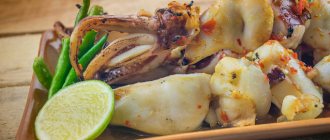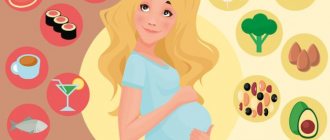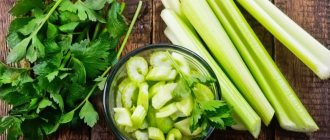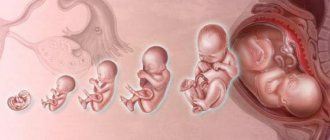During pregnancy, a woman needs to choose her food carefully. What was once enjoyed as food can now harm the health of mother and baby.
As you know, seafood is one of the main sources of protein - the main building material for cells, organs and internal systems of the fetus. But not all of them are approved for use during pregnancy.
Is it possible for pregnant women to eat mussels, what are the benefits and harms of this seafood, and in what form is it best to consume them?
Are fish and seafood healthy during pregnancy?
The answer is yes! But provided that a high-quality version of sea fish and seafood is chosen and is thoroughly heat treated. It is often recommended to exclude river fish from the diet during pregnancy, as it can cause helminthiasis (infection with worms). River fish may be infected with parasites, which may not be destroyed during heat treatment. Sushi can be eaten, but only if the fish has been heat-treated.
- Fish is a good source of zinc, iron and protein, which are essential for a child's growth.
- Omega-3 fatty acids present in seafood will help in the development of the baby's brain in the womb.
- Provides better memory
- Prevents postpartum depression and mood swings
- Reduces problems with the risk of heart disease
- Keeps blood pressure normal
- Reduces blood clotting problems
Hazardous substances
Fish and seafood during pregnancy are recommended to be consumed in moderation. Some of them contain harmful substances:
- pesticides;
- polychlorinated biphenyls (PCBs);
- dioxins (albeit to a small extent);
- mercury.
When you consume seafood, there is little risk to an adult's health, but it can seriously damage a child's nervous system and affect brain development. According to the recommendations of nutritionists, expectant mothers should not consume more than 340-350 grams of fish per week. That's the equivalent of two average seafood dishes.
What should you avoid while you are pregnant?
Some of you may be wondering if it is safe to eat shellfish such as oyster or even crab while pregnant. Currently, it is highly recommended to avoid raw shellfish as it may lead to contamination by virus, bacteria or other toxins, which is not safe for the baby in the womb.
If you really want to, you can eat the following seafood, but on the condition that they are well cooked:
- Crabs
- Scallops
- Oysters
- Shrimps
- Shellfish
- Shore snails
In addition to the fact that it is safest for pregnant women to consume fish no more than 2 times a week, it is also important to cook it correctly. The fried version is too heavy, so it is recommended to give preference to grilled, oven or steamed options.
Photo: shutterstock
What is better to use
Proper nutrition helps the expectant mother take care of her health and the development of the baby, so you need to choose fish that contain less mercury and more Omega-3:
- herring;
- anchovies;
- salmon and trout;
- Atlantic (Pacific) mackerel;
- pollock and hake;
- catfish
Useful properties of some seafood:
- Sardines contain a lot of fatty acids. They have a beneficial effect on the nervous and mental development of the child, and a pregnant woman will be relieved of late toxicosis and depression.
- Shrimp is one of the healthiest seafood: it contains iron, zinc, fatty acids, copper, potassium, and phosphorus. These substances contribute to the formation of bones and brain of the fetus.
- Salmon contains Omega-3 and iodine, which is beneficial for the health of the thyroid gland of a pregnant woman and the vision of the unborn child.
- Oysters . This is a storehouse of useful substances: protein, zinc, magnesium, potassium and vitamin E support and strengthen the heart, prevent the development of cardiovascular diseases.
Can I eat:
- smoked fish during pregnancy
Smoked, dried and dried fish are prohibited for pregnant women, since the processing of such products may not be sufficient to destroy all bacteria and helminths. Fish that has only been cold smoked is especially dangerous. In it, as in raw fish, listeria is often found - a rod-shaped bacterium that causes severe intoxication of the mother's body, delayed fetal development and miscarriage. Hot smoked fish is considered more acceptable as it undergoes heat treatment. However, another problem awaits here. Increasingly, unscrupulous manufacturers are using special chemical compounds to give the product a pronounced “smoked” taste, smoky aroma and golden color. Such substances are definitely harmful, so it’s not worth the risk.
- salted fish during pregnancy
Heavily salted fish is also contraindicated for expectant mothers. Excess sodium chloride only creates additional stress on a woman’s kidneys, increases blood pressure and increases swelling of the extremities. It is preferable to buy unsalted or lightly salted fish products.
- red fish during pregnancy
Salmon, trout and other types of red fish are very healthy for pregnant women. But due to the high fat content, such fish should be consumed no more than once a week. It is also important to remember the danger of allergic reactions. Red fish, like crustacean meat, contains large amounts of the amino acid histidine. It is this that can provoke a powerful release of histamine in the human body, up to anaphylactic shock.
- seafood during pregnancy
Seafood is a source of pure protein and valuable microelements. But they have practically no fat, and they are very easily absorbed by the body. Seafood also has a positive effect on intestinal function, stimulates appetite, reduces cholesterol levels in the blood and improves the condition of skin and hair, which often suffer during pregnancy. Therefore, it is highly advisable for expectant mothers to include seafood in their diet.
Squid, shrimp, scallops and crabs are rich in potassium, iodine and iron. They also contain vitamins B, E and C, which are so necessary for the harmonious development of the baby.
More on the topic
Is it possible to eat shrimp during pregnancy?
Can you eat apricots during pregnancy?
Should you take vitamins in early pregnancy?
Is it possible to eat red caviar during pregnancy?
Can I eat pine nuts during pregnancy?
Oysters are also a storehouse of protein and vital chemical elements, especially zinc. However, during pregnancy they should be consumed in very moderate quantities, preferably only in the second trimester and, of course, after careful heat treatment. So no oyster bars with raw shellfish. It is better to avoid mussels altogether - they, like small filters, pass tons of sea water through themselves and can accumulate toxic substances.
Also, do not forget that for the inhabitants of the continent, seafood is always exotic. Therefore, the risk of allergies cannot be excluded. Moreover, it often first appears during pregnancy. Always start your meal with a small piece of fish or seafood and carefully monitor the condition of your body.
How to cook properly?
To eliminate the possibility of infection by various parasites and preserve beneficial elements, it is recommended to prepare fish in the following ways:
- For a couple. Place the cleaned fish or fillet on a mesh in a steamer and set the required cooking mode. To make the meat tender and juicy, you need to marinate it in advance in olive oil with spices, lemon juice or soy sauce. This method of preparation is best suited for pregnant women; the dish is considered dietary.
- Boil. Salmon, salmon, and trout make thick, rich broths. They are used to make vegetable or creamy soups.
- Bake. Despite heat treatment, the product retains all nutrients. The fillet or whole carcass should be wrapped in foil, you can first sprinkle it with lemon juice, and put vegetables next to it. Bake in the oven at 200°C for 10 minutes (if the carcass is not thicker than 2.5 cm).
Pregnant women often want something salty, so you can cook some salted, dried or dried fish yourself; it won’t hurt in small quantities. Below is a recipe for salting trout at home:
- wash fresh trout thoroughly and cut into thin pieces,
- place the pieces in layers in an enamel or ceramic container, sprinkle each layer with salt,
- cover the container with a lid and place in a cool place for 16 hours,
- After 16 hours, the fish is ready to eat; it should be stored in the refrigerator for no longer than a few days.
Which one is better to refuse?
There are species that need to be abandoned during this important period. Recently, due to the general pollution of the ocean, you can find fish in which the content of mercury and dioxin is exceeded
. These include:
- marine predatory fish;
- species that live at the bottom;
- long-lived species.
Types that are prohibited for a pregnant woman:
- mackerel;
- swordfish;
- shark;
- tuna;
- halibut;
- marlene;
- sea bass;
- king mackerel.
Did you know?
When salmon spawn, they make a long journey from the open sea to the stream in which they were born.
This road takes all the strength, and after throwing the salmon dies, giving food to the fry. Scientists still do not know how and by what criteria it finds its homeland. There are four options for preparing fish dishes:
- For a couple.
Vitamins and microelements are preserved. Pre-marinated in olive oil with lemon and your favorite spices and herbs. - In the oven.
All beneficial substances are preserved, and the taste becomes rich and aromatic. To preserve juiciness, you can wrap the fish in foil. - Cooking.
A small fish is placed in boiling water, and a large fish is placed in cold water. You can add bay leaf, allspice and onion to the water to improve the taste. - You can prepare fish cutlets
or other dishes, but only from minced meat prepared yourself from fresh fish.
The best addition to such dishes are boiled vegetables, fresh in the form of a salad or baked.
If you have problems with digestion, then you should also avoid fish broths, as they increase the acidity of the stomach.
Precautionary measures
From the above text it becomes clear that it is forbidden to eat oysters raw during pregnancy. However, if a woman has previously eaten such a dish and it did not cause allergic reactions in her, then oysters can be included in the diet, but only after preliminary heat treatment and they should be eaten immediately after cooking. A prerequisite is that the finished oysters have a firm texture (you need to check this for yourself).
An experienced doctor will recommend consuming this dish exclusively in the second trimester of pregnancy, since in the first and third trimester there remains a high risk of negative effects on the baby’s growing body and the health of the mother.
Seafood looks very tempting and romantic on a beautiful plate in a cozy restaurant. However, pregnant women should first of all think about their well-being, realistically assess the risks and benefits of the desired food, and also try in every possible way to preserve the health of their unborn child.
Methods of use
Mussels are a light and easily digestible product. After eating them, there is no feeling of heaviness in the stomach.
Doctors recommend avoiding eating canned mussels and shellfish in oil. Such canned seafood is the least healthy, especially for expectant mothers.
The fact is that mussels marinated in oil contain a large amount of fats and carbohydrates, which can cause problems in the gastrointestinal tract.
Also, the amount of useful substances in them is much less than in fresh shellfish, and the preservatives and additives added during the preparation of the marinade do not provide any benefit to the body.
Doctors consider the best way to eat mussels to be self-cooking shellfish purchased fresh or frozen. Moreover, during heat treatment, mussels practically do not lose their beneficial properties.
Can pregnant women eat lightly salted red fish?
Salted, dried and dried fish contain quite a large amount of salt. Therefore, it is advisable for pregnant women to avoid such products, as they can cause swelling and increased blood pressure.
If you want salty food, this indicates a lack of chlorides in the body. The following are good options for replenishing them:
- fatty varieties of seafood (salmon, trout, coho salmon, mackerel);
- goat milk;
- sea salt.
No added spices, just salt and oil. Salmon was bought at the Stary Pakha store (November 23) You can do whatever your body wants..Annya Klyueva (November 23) Why can’t you use spices? Natalya Borisova (November 23) You can) Parker Doff (November 23) You can, but within reason Katerina Kukharenok (23 November) anything is possible, as long as it’s fresh (not poisoned) Yellow Partisan (November 23) Katyukha... better not take risks, salmon (sturgeon)... if only you know what “vyaziga” is and what to do with it. If you know... - it’s a sin to refuse pregnant women. Ledy (November 23) you can Evgenia (November 23) It’s even necessary)))
Is this normal? Girls, HELP!!! I am 12 years old and I really want s***, but I don’t want my (lower self) wants what to do? Can a gynecologist put a finger into a virgin’s vagina? What pills can make you lose consciousness? How to hide from the gynecologist that I am no longer virgin? why do I have pain in my balls after sex?
How does masturbation affect the gain of muscle mass and overall health? What breast size should be at 13 years old? I’m pregnant and don’t want a child, what should I do?? I slept with my sister on my birthday. now she is pregnant from me. we are brother and sister. she wants a child, what will happen if you give it to the ass...
If you cum in a girl, but not completely? Is it possible to cum in a pregnant woman? The guy cum in me. I immediately went and washed everything “there” inside with soap 3 times. what is the probability of getting pregnant? where do you have to cum for a girl to get pregnant? If a girl doesn’t cum, but a guy cums in her, can she get pregnant? How is male sperm useful for women???
What can replace fish?
Fish is a must-have product for a balanced diet for an expectant mother. But what to do if a woman is allergic, or the smell and taste of fish suddenly becomes repulsive during pregnancy? Fish and seafood can be replaced with special preparations containing Omega-3 and Omega-6 acids. At the same time, the choice of nutritional supplement, course duration and dosage are always within the competence of the doctor observing the pregnancy.
You can also diversify your diet with seaweed. It, like fish, contains: iodine, phosphorus, magnesium, calcium, sodium, folic acid, vitamins A, B, C, D, E and group B. Not a single vegetable or fruit can boast of such a composition. It is best to purchase fresh, dried or frozen kelp, since ready-made pickled cabbage contains too much vinegar and salt.
Thus, fish and seafood are an important part of the expectant mother’s diet. They ensure the normal development of the child, and give the woman herself strength and good mood for all 9 months of pregnancy.
Especially for beremennost.net – Elena Kichak
Unsafe Choices: What to Avoid
A potentially dangerous choice would be fish raised in artificial conditions. It is no secret that in this case she may be stuffed with antibiotics - this is not good for the mother, much less for the fetus developing in her womb.
The second most important criterion of danger is the content of mercury, which reaches significant levels in lakes and oceans. Converting there into a neurotoxin - methylmercury, it accumulates in the fish as it grows. Therefore, large varieties of predatory fish should be especially avoided:
- shark;
- swordfish;
- mackerel;
- tuna;
- sea bass.
High levels of mercury are very dangerous for the developing fetus and can lead to neurological disorders, problems with cognitive development, and other mental and physical delays. White tuna (albacore) is considered relatively safe and is the most popular and affordable option, containing less mercury. However, in the early stages of pregnancy it is better to exclude it from the diet completely.









